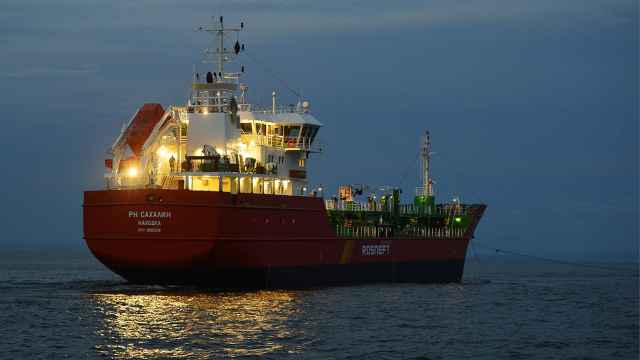With his final days in office counting down, President Dmitry Medvedev on Monday ordered a review into the conviction of the country's most famous prisoner, former Yukos chief Mikhail Khodorkovsky, whose jailing has long been considered politically motivated.
Medvedev instructed the Prosecutor General's Office to "analyze the legality" of the case along with that of Khodorkovsky's business partner Platon Lebedev and 30 others, the Kremlin announced on its website.
Many of the names put up for review were included on a list brought to Medvedev by opposition leaders at a meeting on Feb. 20.
In a separate order, Medvedev asked Justice Minister Alexander Konovalov to provide legal reasons for denying the registration of the liberal political party Parnas, which was founded by former Prime Minister Mikhail Kasyanov and political figures Vladimir Ryzhkov and Boris Nemtsov.
The party was barred from registering last June over contradictions in party's charter. Party officials, however, had argued that the denial was politically motivated.
Political observers said the moves represented Medvedev's last effort to leave some sort of legacy before he relinquishes the presidency to Vladimir Putin on May 7, but it was unclear whether it would result in any real change.
"It is an attempt to beat out the clock. Medvedev wants to leave his mark on history, but to give an order for a review does not mean these decisions will be overturned," said Mark Feigin, a political analyst and member of the Solidarity political movement.
But as Medvedev has only two months left in office, legal experts say the fate of Khodorkovsky and other prisoners on the list will likely rest in Putin's hands. Khodorkovsky's legal team greeted the news cautiously.
"Medvedev's order might be a positive sign, but only if there is a decision by Putin that Khodorkovsky has been in prison long enough and they are ready to find a way to free him," lawyer Yury Schmidt told Russian News Service Radio.
Earlier, Medvedev and Putin had made contradictory statements about Khodorkovsky. Medvedev suggested that the case could be re-examined while Putin — who has long been believed to view Khodorkovsky as a bitter enemy — called Russia's former richest man a "thief" who "should remain in prison."
Pavel Salin, an expert with the Kremlin-connected think tank Center for Current Politics, said that while Medvedev's announcement may have come as part of an agreement with Putin, it is unlikely that the president-elect intends to free Khodorkovsky before his term expires in 2017.
"There will be a different approach to other cases, but Khodorkovsky is one that will not be reconsidered," Salin predicted.
He added that concessions might be made to release several low-profile prisoners and register the Parnas party.
"But the registration will be meaningless because of pending legislation that will allow it anyway," Salin said.
He was referring to Medvedev's proposed bill to ease the requirements for party registration. The bill would only require a party to have 500 members nationwide instead of 40,000, as is required now.
The legislation has passed a first reading in the State Duma, but it is unclear whether it will be adopted before Medvedev will leave office.
Prosecutor General Yury Chaika's spokeswoman told Interfax on Monday that her boss had taken charge of handling the presidential order personally.
Some opposition activists noted that some of the 40 names from the list originally presented to Medvedev were not included in the list of those being reconsidered.
Among them was Taisia Osipova, the wife of an opposition activist, who was sentenced to 10 years on drug charges in 2011. Her conviction was recently overturned, but the case was ordered for retrial.
The list, however, included several North Caucasus natives imprisoned for terrorism-related charges and a far-right nationalist. Their inclusion on the list has caused a division among members of the opposition, a source told The Moscow Times.
Among those on the list is Timur Ishmuratov, who was accused of taking part in a terrorist attack on a gas pipeline in Tatarstan. Ishmuratov was arrested by NATO forces in Afghanistan in 2003 and released to Russian authorities the following year. He was ultimately freed but rearrested in the pipeline plot in 2005. Ishmuratov's lawyers claim that he was tortured to force him to confess to the crime.
A Message from The Moscow Times:
Dear readers,
We are facing unprecedented challenges. Russia's Prosecutor General's Office has designated The Moscow Times as an "undesirable" organization, criminalizing our work and putting our staff at risk of prosecution. This follows our earlier unjust labeling as a "foreign agent."
These actions are direct attempts to silence independent journalism in Russia. The authorities claim our work "discredits the decisions of the Russian leadership." We see things differently: we strive to provide accurate, unbiased reporting on Russia.
We, the journalists of The Moscow Times, refuse to be silenced. But to continue our work, we need your help.
Your support, no matter how small, makes a world of difference. If you can, please support us monthly starting from just $2. It's quick to set up, and every contribution makes a significant impact.
By supporting The Moscow Times, you're defending open, independent journalism in the face of repression. Thank you for standing with us.
Remind me later.





